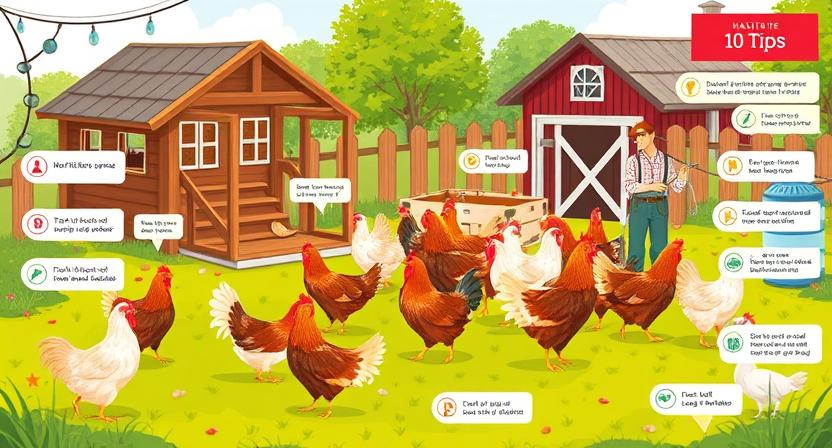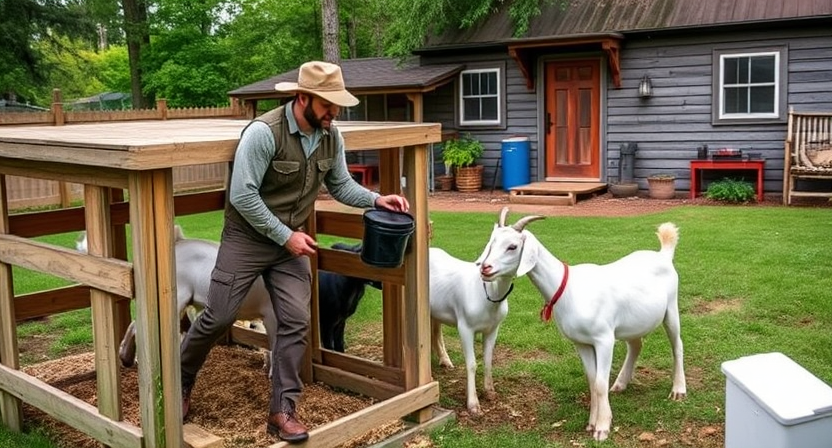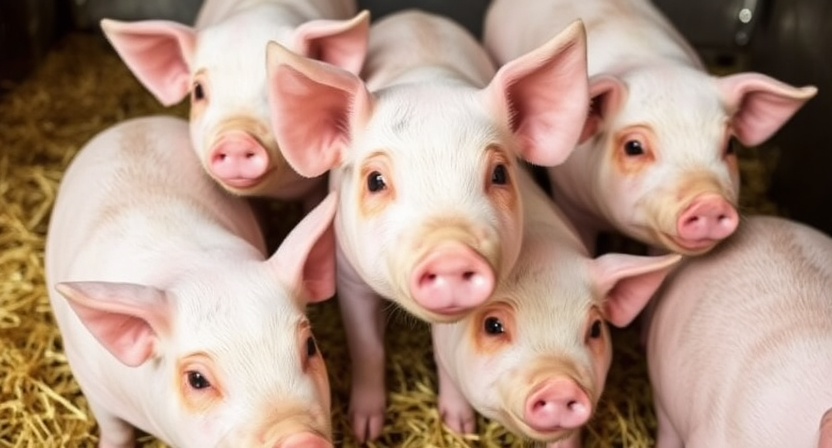10 Tips for Raising Healthy Chickens

Tips for Feeding Chickens

When it comes to feeding chickens, it’s crucial to provide them with a balanced diet to ensure their health and productivity. A good quality commercial chicken feed is a great foundation for their nutrition, but supplementing this with fresh fruits, vegetables, and grains can enhance their diet. Additionally, offering access to grit and oyster shells will help with their digestion and calcium intake. It’s important to always ensure that there is a constant supply of fresh, clean water available to the chickens, as dehydration can lead to serious health issues.
Monitor your chickens’ feeding habits closely to ensure they are eating enough but not overeating. Adjust the amount of food provided based on their appetite and the number of birds you are feeding. Avoid feeding them moldy or spoiled food, as this can make them sick. Lastly, consider incorporating natural treats like mealworms or sunflower seeds into their diet as occasional snacks to keep them happy and stimulated. Remember, a well-fed chicken is a happy and healthy chicken!
• Provide a balanced diet with commercial chicken feed as foundation
• Supplement with fresh fruits, vegetables, and grains
• Offer access to grit and oyster shells for digestion and calcium intake
• Ensure constant supply of fresh, clean water available
• Monitor feeding habits closely to prevent overeating
• Adjust food amount based on appetite and number of birds
• Avoid feeding moldy or spoiled food
• Incorporate natural treats like mealworms or sunflower seeds as occasional snacks
Tips for Providing Proper Shelter
When providing shelter for your chickens, it is essential to ensure that the coop is spacious enough to accommodate the number of birds you have. Chickens need ample space to move around comfortably and engage in natural behaviors like scratching and dust bathing. A crowded or cramped living environment can lead to stress and aggression among the flock, impacting their overall health and egg production.
Additionally, the coop should be well-ventilated to prevent the buildup of ammonia from droppings, which can be harmful to the respiratory health of the chickens. Good airflow helps regulate temperature and moisture levels inside the coop, creating a more comfortable environment for your feathered friends. Consider installing windows or vents that can be opened and closed as needed to ensure proper ventilation year-round.
– Provide at least 2-3 square feet of space per chicken in the coop
– Allow for outdoor access to a run or free-range area for additional space and natural behaviors
– Clean the coop regularly to prevent ammonia buildup and maintain good air quality
– Install windows or vents for proper ventilation and airflow
– Monitor temperature and moisture levels inside the coop to ensure a comfortable environment
Tips for Maintaining Cleanliness
Regular cleaning is essential for maintaining a healthy environment for your chickens. The coop should be cleaned out on a regular basis to remove any droppings, old bedding, and debris that can harbor harmful bacteria and parasites. Keeping the coop clean also helps prevent unwanted odors that can attract pests and make the chickens more susceptible to respiratory issues.
In addition to cleaning out the coop, it’s important to regularly clean and replenish the chickens’ water and food containers. Dirty water can quickly become contaminated with bacteria, leading to illnesses in the flock. Similarly, old or spoiled food can attract pests and mold, which can pose a threat to the chickens’ health. By keeping their water and food containers clean and filled with fresh supplies, you can help ensure that your chickens stay healthy and well-nourished.
• Regularly clean out the coop to remove droppings, old bedding, and debris
• Prevent harmful bacteria and parasites from thriving in the coop
• Avoid unwanted odors that can attract pests and cause respiratory issues
• Clean and replenish water containers regularly to prevent bacterial contamination
• Ensure food containers are clean and free of mold to avoid attracting pests
• Keep water and food containers filled with fresh supplies for healthy chickens
Tips for Monitoring Chicken Health
Checking your chickens’ health regularly is crucial for ensuring a thriving flock. Observe their behavior and look for any signs of distress or abnormality. Healthy chickens are usually active, alert, and have a good appetite. Be on the lookout for any changes in their behavior, such as lethargy or isolation from the flock. Any sudden changes in their behavior could indicate a potential health issue that needs to be addressed promptly.
In addition to observing their behavior, regularly check your chickens’ physical appearance. Look for any signs of injury, such as cuts or bruises, and inspect their feathers for parasites like mites or lice. Monitor their droppings for any changes in color, consistency, or odor, as these could be indicators of underlying health problems. By staying vigilant and conducting regular health checks, you can catch any issues early and ensure the well-being of your feathered friends.
• Observe their behavior for any signs of distress or abnormality
• Look out for changes in behavior such as lethargy or isolation from the flock
• Check their physical appearance for injuries, cuts, bruises, and parasites like mites or lice
• Monitor their droppings for changes in color, consistency, or odor
• Conduct regular health checks to catch any issues early and ensure the well-being of your chickens
Tips for Preventing Diseases
To prevent diseases in your chicken flock, start by implementing strict biosecurity measures. This includes limiting access to outsiders, disinfecting equipment, and quarantining new birds before introducing them to the existing flock. Regularly clean and sanitize coops, feeders, and waterers to minimize the spread of pathogens. Additionally, provide proper nutrition to strengthen their immune systems and reduce their susceptibility to diseases.
Regularly monitor your chickens for any signs of illness or abnormal behavior. Early detection can help prevent the spread of diseases within the flock. Ensure that sick birds are isolated and receive prompt veterinary care to prevent further contamination. Vaccinate your chickens against common diseases to provide an added layer of protection. By being proactive and vigilant, you can significantly reduce the risk of disease outbreaks in your chicken coop.
• Limit access to outsiders
• Disinfect equipment regularly
• Quarantine new birds before introducing them to the flock
• Clean and sanitize coops, feeders, and waterers
• Provide proper nutrition for strong immune systems
Regularly monitor chickens for signs of illness or abnormal behavior.
Isolate sick birds and provide prompt veterinary care.
Vaccinate chickens against common diseases.
Be proactive and vigilant to reduce disease outbreaks in the coop.
Tips for Handling Chickens Properly

Handling chickens properly is essential for their well-being and your safety. When picking up a chicken, approach calmly and confidently, making sure to support its body fully to prevent any harm or stress to the bird. Keep a close eye on their body language and listen to their vocalizations to gauge their comfort level during handling.
It’s important to handle chickens gently and avoid sudden movements that could startle them. When holding a chicken, keep them close to your body to provide a sense of security and stability. Always wash your hands before and after handling chickens to prevent the spread of any potential diseases and maintain good hygiene practices.
• Approach chickens calmly and confidently
• Support the chicken’s body fully when picking them up
• Watch their body language and vocalizations for comfort level
• Handle chickens gently to avoid startling them
• Keep chickens close to your body for security
• Wash hands before and after handling chickens
Proper handling of chickens not only ensures their well-being but also reduces the risk of injury or stress. By following these tips, you can create a safe and comfortable environment for both you and your feathered friends. Remember that each chicken is unique, so take the time to get to know their individual preferences and boundaries when it comes to handling. With patience and care, you can build a strong bond with your chickens while keeping them happy and healthy.
Tips for Ensuring Proper Nutrition
When it comes to ensuring proper nutrition for your chickens, it is essential to provide them with a balanced and varied diet. A good quality commercial poultry feed that is specifically formulated for chickens can serve as the foundation of their diet. This feed should be supplemented with fresh fruits, vegetables, grains, and protein sources such as mealworms or crickets to ensure they are getting all the necessary nutrients.
Additionally, it is crucial to provide your chickens with access to clean and fresh water at all times. Water is essential for digestion, nutrient absorption, and overall health. Make sure to regularly clean and refill their water containers to prevent contamination and ensure that they are adequately hydrated. Proper hydration is key to maintaining good health and maximizing your chickens’ productivity.
• Provide a balanced and varied diet for your chickens
• Use good quality commercial poultry feed as the foundation of their diet
• Supplement with fresh fruits, vegetables, grains, and protein sources like mealworms or crickets
• Ensure access to clean and fresh water at all times
• Regularly clean and refill water containers to prevent contamination
Tips for Providing Adequate Water
Chickens require constant access to clean and fresh water to stay healthy and hydrated. Providing an adequate supply of water is crucial for their overall well-being. Make sure to regularly check and refill their water containers to ensure they always have enough to drink throughout the day.
When selecting water containers for your chickens, opt for ones that are easy to clean and large enough to accommodate the number of birds in your flock. Position the water containers in a shaded area to prevent the water from getting too warm or dirty. Regularly monitor the cleanliness of the water and clean the containers as needed to prevent the buildup of bacteria or algae that could harm your chickens.
• Chickens require constant access to clean and fresh water for hydration
• Regularly check and refill water containers to ensure an adequate supply
• Select water containers that are easy to clean and large enough for your flock
• Position containers in a shaded area to prevent water from getting too warm or dirty
• Monitor cleanliness of water regularly and clean containers as needed
Tips for Managing Chicken Behavior
Understanding and managing chicken behavior is crucial for maintaining a harmonious flock. Chickens have their own social hierarchy, with each bird having a specific role within the group. By observing their interactions, you can gain insight into their behavior and address any potential conflicts that may arise. Ensuring that there is enough space for each chicken to establish their territory can help minimize aggressive behavior and promote a peaceful environment within the flock. Additionally, providing enrichment activities like perches, dust baths, and toys can help keep chickens stimulated and prevent boredom-induced pecking or aggression.
Consistency is key when managing chicken behavior. Establishing a predictable routine for feeding, watering, and interacting with your flock can help reduce stress and anxiety among the chickens. By maintaining a calm and confident demeanor around the birds, you can establish yourself as the leader of the flock, promoting respect and obedience from the chickens. Implementing positive reinforcement techniques, such as rewarding good behavior with treats, can also help shape desirable behaviors and encourage cooperation within the flock.
• Providing enough space for each chicken to establish their territory
• Observing interactions to gain insight into behavior
• Offering enrichment activities like perches, dust baths, and toys
• Establishing a predictable routine for feeding, watering, and interacting with the flock
• Maintaining a calm and confident demeanor around the birds
• Implementing positive reinforcement techniques such as rewarding good behavior with treats
Tips for Ensuring Proper Ventilation
Proper ventilation is crucial for maintaining the health and well-being of your chickens. Good ventilation helps to remove excess moisture, ammonia, and other harmful gases that can build up in the coop, leading to respiratory issues and other health problems for the birds. Inadequate ventilation can also result in poor air quality, which can impact egg production and overall chicken health.
When designing or assessing the ventilation in your chicken coop, make sure there are adequate openings for fresh air to enter and stale air to exit. Consider the size of your flock, the layout of the coop, and the climate in your area when determining the ventilation needs. It’s important to strike a balance between allowing for good airflow without creating drafts that can chill the chickens. Regularly inspecting and maintaining the ventilation system will help ensure that your chickens have a healthy environment to thrive in.
• Proper ventilation is crucial for maintaining the health and well-being of your chickens.
• Good ventilation helps to remove excess moisture, ammonia, and other harmful gases that can build up in the coop.
• Inadequate ventilation can result in poor air quality, impacting egg production and overall chicken health.
• When designing or assessing ventilation, ensure there are adequate openings for fresh air to enter and stale air to exit.
• Consider factors such as flock size, coop layout, and climate when determining ventilation needs.
• Strike a balance between good airflow without creating drafts that can chill the chickens.
• Regularly inspecting and maintaining the ventilation system will help ensure a healthy environment for your chickens.
Tips for Protecting Chickens from Predators

Install sturdy fencing around the chicken coop to prevent predators from gaining easy access. Make sure the fencing is buried at least a foot underground to deter digging predators such as foxes and raccoons. Additionally, consider installing an apron of fencing that extends outward from the base of the coop to prevent predators from burrowing underneath.
Utilize motion-activated lights and alarms near the coop to startle and deter nighttime predators. Solar-powered lights can be a cost-effective and environmentally friendly option for illuminating the area around the coop. Regularly inspect the perimeter of the coop for any signs of digging or attempts by predators to breach the fencing.
• Install sturdy fencing around the chicken coop
• Ensure fencing is buried at least a foot underground
• Consider installing an apron of fencing to prevent burrowing predators
• Use motion-activated lights and alarms near the coop
• Opt for solar-powered lights for cost-effectiveness
• Regularly inspect perimeter for signs of digging or attempts by predators
Tips for Providing Enough Space
When it comes to raising chickens, providing enough space is crucial for their well-being. Overcrowding can lead to stress, aggression, and the spread of diseases among the flock. Each chicken should have ample room to move around, stretch their wings, and engage in natural behaviors like scratching and dust bathing. A general rule of thumb is to provide at least 2-4 square feet of space per chicken inside the coop, and 8-10 square feet of space per chicken in the outdoor run. This ensures that they have enough space to roam freely and maintain their overall health.
Additionally, adequate space reduces the likelihood of feather pecking and cannibalism within the flock. Chickens that are cramped together may exhibit more aggressive behaviors towards one another, leading to injuries and overall decreased welfare. By allowing sufficient space for each chicken, you can promote a harmonious and stress-free environment, ultimately contributing to happier and healthier birds.
– Providing at least 2-4 square feet of space per chicken inside the coop
– Offering 8-10 square feet of space per chicken in the outdoor run
– Preventing stress, aggression, and disease spread among the flock
– Allowing chickens to engage in natural behaviors like scratching and dust bathing
– Reducing the likelihood of feather pecking and cannibalism within the flock
Tips for Ensuring Proper Lighting
To ensure proper lighting for chickens, it is crucial to provide a consistent light source in their coop. This consistency helps maintain their natural circadian rhythms, which can positively impact their behavior and overall health. Installing a timer for the lights can help regulate the amount of light exposure they receive each day.
Additionally, it is important to position the lights in a way that evenly distributes light throughout the coop, avoiding any harsh shadows or dark spots. This can help prevent stress in the chickens and encourage them to move around and explore their environment more freely. Remember to regularly check and replace any bulbs that may have burnt out to ensure optimal lighting conditions for your feathered friends.
• Position lights to evenly distribute light
• Avoid harsh shadows or dark spots
• Regularly check and replace burnt out bulbs
To further enhance the lighting in the coop, consider using different types of lighting sources. Natural sunlight is ideal for chickens, so if possible, allow some natural light to enter the coop during the day. This can help regulate their internal clocks and provide them with a sense of time passing.
In addition to natural light, you may also want to supplement with artificial lighting sources such as LED or fluorescent lights. These can provide consistent and bright illumination for your chickens, especially during darker months or shorter days. Make sure to adjust the brightness levels accordingly based on your chicken’s needs and preferences.
• Allow natural sunlight into the coop
• Supplement with artificial lighting sources like LED or fluorescent lights
• Adjust brightness levels based on chicken’s needs
Tips for Maintaining a Consistent Routine
Establishing a consistent routine for your chickens is crucial for their health and well-being. Having set feeding times helps regulate their digestion and ensures they are receiving the necessary nutrients. Additionally, maintaining a regular schedule for cleaning their living space minimizes the risk of diseases and maintains a comfortable environment for the chickens.
Incorporating a daily routine that includes checking on the chickens’ health and behavior allows you to quickly identify any potential issues that may arise. By observing their behavior and appearance regularly, you can prevent the spread of illnesses and address any concerns promptly. Overall, a consistent routine not only benefits the chickens but also contributes to a more efficient and organized management of your poultry.
• Establish set feeding times to regulate digestion and ensure necessary nutrients
• Maintain a regular cleaning schedule for their living space to minimize disease risk
• Check on chickens’ health and behavior daily to quickly identify potential issues
• Observing behavior and appearance regularly can prevent spread of illnesses
• Consistent routine benefits chickens’ health and contributes to efficient poultry management
Tips for Identifying Signs of Illness
Identifying signs of illness in chickens is important for maintaining the overall health of your flock. One common sign to watch for is a decrease in egg production or changes in the quality of the eggs being laid. If you notice any abnormalities in the eggs, it may be an indication that something is not right with the hen’s health. Additionally, keep an eye out for any changes in behavior such as lethargy, decreased appetite, or increased aggression, as these could be signs of underlying health issues that need to be addressed promptly.
Another key indicator of illness in chickens is abnormal respiratory sounds or discharge from the eyes or nostrils. Wheezing, coughing, or sneezing may signal respiratory infections, while discharge from the eyes or nostrils could indicate an underlying illness that requires veterinary attention. In addition, pay attention to any changes in the appearance of the feathers or skin, as mites, lice, or other parasites can cause feather loss or skin irritations. Regularly monitoring your chickens for these signs of illness can help prevent the spread of disease and ensure the well-being of your flock.
• Decrease in egg production or changes in egg quality
• Changes in behavior such as lethargy, decreased appetite, or increased aggression
• Abnormal respiratory sounds or discharge from eyes/nose (wheezing, coughing, sneezing)
• Changes in appearance of feathers or skin (mites, lice, parasites)
Tips for Regularly Inspecting Chickens

Regularly inspecting your chickens is crucial to maintaining their health and well-being. One important aspect to check during inspections is their overall appearance. Look for any signs of injuries, feather loss, or abnormalities in their posture or behavior. Identifying and addressing any physical changes early on can prevent potential health issues from escalating.
Additionally, pay attention to the cleanliness of the coop and nesting areas during inspections. A clean environment is essential for preventing diseases and parasites. Regularly removing soiled bedding, ensuring proper ventilation, and keeping feed and water sources clean are all vital components of maintaining a healthy living space for your chickens. By staying vigilant and proactive in your inspections, you can help ensure a safe and comfortable environment for your feathered friends.
• Check for signs of injuries, feather loss, or abnormalities in posture or behavior
• Address any physical changes early on to prevent health issues from escalating
• Pay attention to the cleanliness of the coop and nesting areas during inspections
• Regularly remove soiled bedding and ensure proper ventilation
• Keep feed and water sources clean to prevent diseases and parasites
Tips for Handling Chicken Eggs
When collecting chicken eggs, it’s essential to handle them with care to prevent any damage or contamination. Ensure that you wash your hands thoroughly before and after handling the eggs to maintain cleanliness. When gathering the eggs from the nesting boxes, gently pick them up and avoid sudden movements to prevent cracking.
After collecting the eggs, it’s crucial to store them properly to maintain their freshness. Store the eggs in a clean and cool place, ideally at room temperature or slightly lower. Avoid washing the eggs unless necessary, as the natural bloom on the eggshell helps protect it from bacteria. By following these simple steps, you can ensure that your chicken eggs are handled safely and stay fresh for longer.
• Wash your hands thoroughly before and after handling chicken eggs
• Gently pick up eggs from nesting boxes to prevent cracking
• Store eggs in a clean and cool place at room temperature or slightly lower
• Avoid washing eggs unless necessary to preserve the natural bloom on the eggshell
Tips for Socializing Chickens
When it comes to socializing chickens, it is important to spend time with them regularly. This can help them get used to human interaction and become more comfortable around people. Handling them gently and speaking to them in a calm, soothing voice can also help build trust between you and your chickens. Additionally, providing treats during socialization sessions can create positive associations with human contact.
Incorporating socialization activities into your daily routine can make a significant difference in how friendly and approachable your chickens are. This can include sitting with them in their coop or run, allowing them to peck around your feet, or simply observing them as they go about their daily activities. Over time, consistent socialization efforts can lead to chickens that are more docile, less skittish, and more enjoyable to interact with.
• Spending time with chickens regularly can help them get used to human interaction
• Handling them gently and speaking to them in a calm, soothing voice can build trust
• Providing treats during socialization sessions can create positive associations with humans
• Sitting with chickens in their coop or run can make them more friendly and approachable
• Allowing chickens to peck around your feet or observing their daily activities can also help socialize them
Tips for Introducing New Chickens
When introducing new chickens to an existing flock, it’s essential to do so gradually to minimize stress and potential conflicts. One effective method is to keep the new chickens separated but within sight of the existing flock for a few days. This allows both groups to get used to each other’s presence without direct contact, reducing the chances of aggressive behavior.
After a few days of visual introduction, you can then proceed to introduce the new chickens to the existing flock in a controlled manner. It’s best to do this during the evening when the chickens are more relaxed and less likely to be aggressive. Supervise the interaction closely to intervene if any bullying or pecking occurs, and be prepared to separate the chickens if necessary to prevent injuries.
• Keep the new chickens separated but within sight of the existing flock for a few days
• Allow both groups to get used to each other’s presence without direct contact
• Reduce chances of aggressive behavior by gradual introduction
• Introduce new chickens to existing flock in a controlled manner after visual introduction
• Best time to introduce is during evening when chickens are more relaxed
• Supervise interaction closely and intervene if bullying or pecking occurs
• Be prepared to separate chickens if necessary to prevent injuries
Tips for Seeking Professional Veterinary Care
If you notice any unusual behaviors or symptoms in your chickens, it is crucial to seek professional veterinary care promptly. Professional veterinarians with experience in poultry health can provide accurate diagnosis and treatment options to ensure the well-being of your flock. Don’t hesitate to reach out to a qualified veterinarian if you have any concerns about the health of your chickens.
Regular check-ups with a poultry veterinarian can help prevent potential health issues and ensure that your chickens are in optimal health. These professionals can offer valuable advice on vaccinations, parasite control, and overall care practices. Remember, early detection and intervention are key in maintaining a healthy and thriving chicken flock.
• Regular check-ups with a poultry veterinarian can prevent potential health issues
• Seek professional veterinary care promptly if you notice any unusual behaviors or symptoms in your chickens
• Professional veterinarians can provide accurate diagnosis and treatment options for your flock
• Don’t hesitate to reach out to a qualified veterinarian if you have concerns about the health of your chickens




